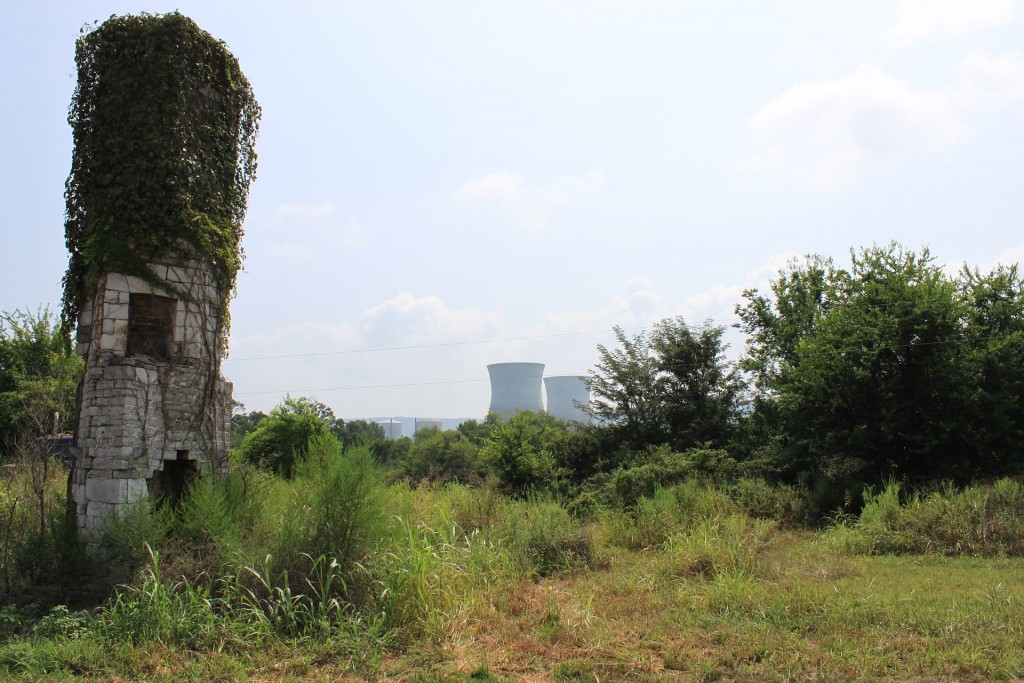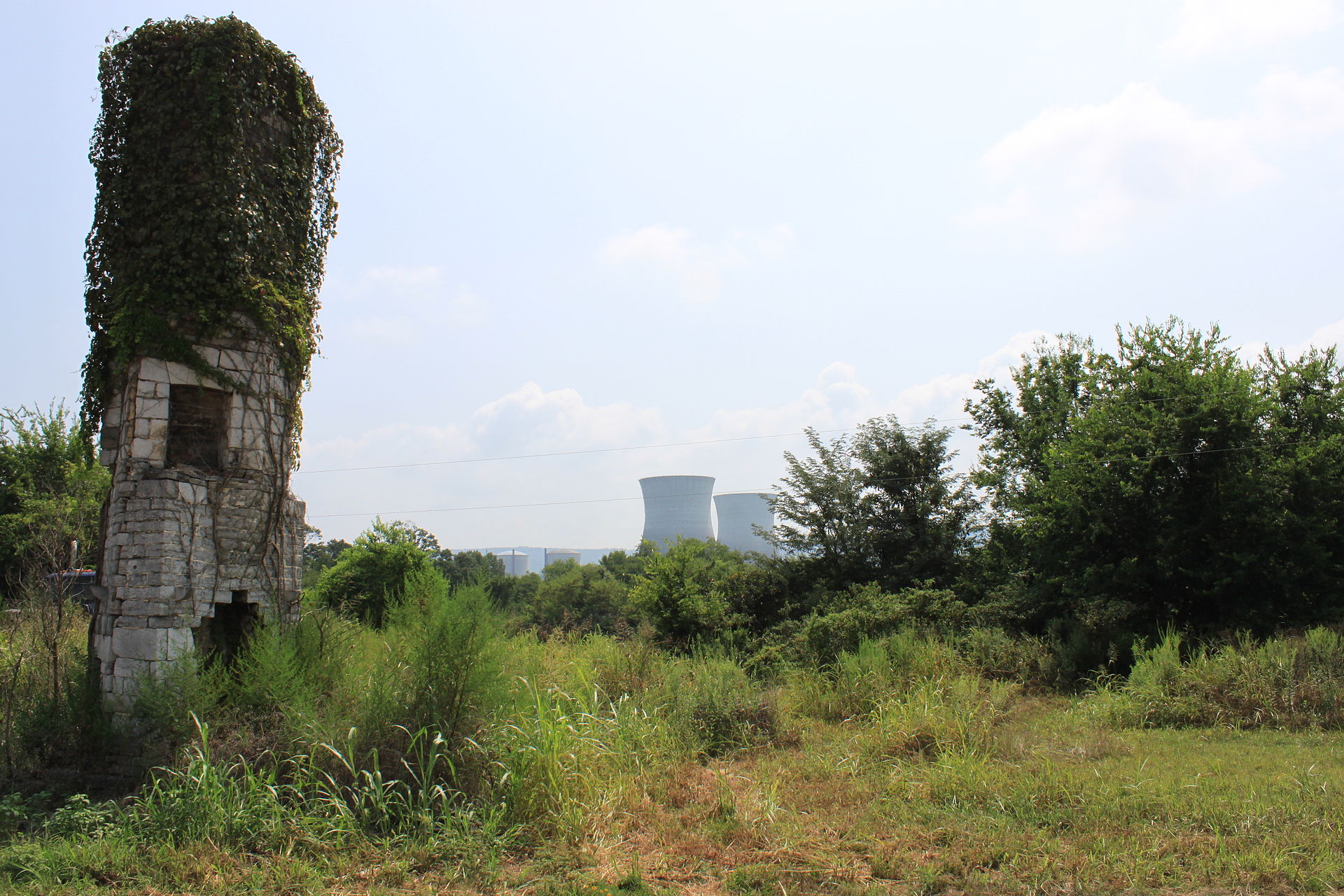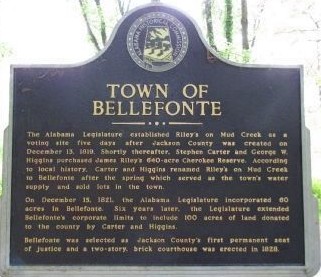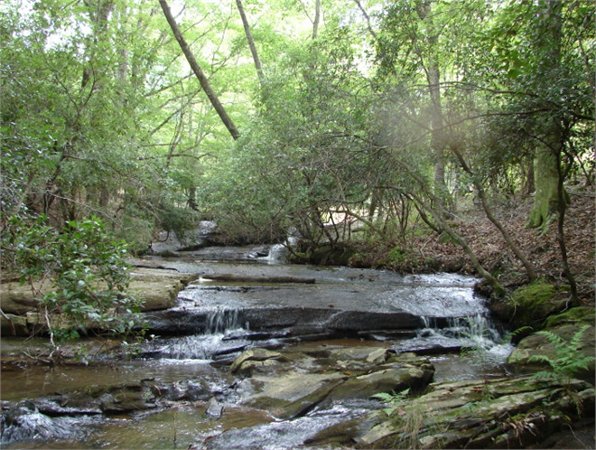Bellefonte is a ghost town in Jackson County, Alabama, United States, near the site of the Bellefonte Nuclear Generating Station. It is located roughly two miles southeast of Hollywood, Alabama.
Private vs Public Lands
The origin of Bellefonte and how it became the county seat of Jackson County, Alabama is related to the circumstances surrounding the public an private line in its earliest days.
Historians think the land around Bellefonte attracted more people and investment of money and effort than most of the other land in the county because a clear deed could be made to protect improvements from speculators before such title was available for public lands.
The Treaty of February 27, 1819, when the Cherokee ceded land that is now part of Jackson County, Alabama north of the Tennessee River also provided for the reservation of 640 acres of land in the ceded area to be had in fee simple for certain specifically named persons. Among these people was James Riley, who in this manner came into the possession of the land on which Bellefonte was eventually established. Under the terms of the Treaty, the ceded area would be protected from intrusion by settlers until January 1, 1820.
On December 13, 1819, an act of the Alabama legislature created Jackson County out of the Cherokee cession, and at the same time fixed a temporary county seat at Sauta Cave. In 1820, people began to settle on the public land in various places around the county. Among the earliest people to settle in the vicinity of the future town of Bellefonte were Dr. George Washington Higgins and Mr. Stephen Carter.
Penal Bond
On October 3, 1820, James Riley bound himself in penal bond for the sum of $13,000.00 to George W. Higgins and Stephen Carter. This bond would be void when the following conditions were met:
- Higgins and Carter paid him $6,500.00 in specified installments to be completed by the year 1824
- Riley had signed over his 640-acre reservation to them
On the strength of this bond, Higgins and Carter founded, surveyed and laid out the town of Bellefonte.
Bellefonte’s name was a subjective description consisting of the French words “belle”, meaning “beautiful,” and “fonte”, meaning “fount,” and was named for a nearby spring that would supply the town’s water for many years.
Legislature appoints seven men
On December 13, 1821, in the same act that created Decatur County out of part of Jackson County, the Alabama legislature appointed seven Jackson County men to choose a temporary seat of justice for the county. On December 15, 1821, the legislature incorporated the town of Bellefonte inclusive of 60 acres and by 1822, the new town of Bellefonte was chosen as the temporary seat of justice for Jackson County. It remained the Jackson County seat from 1821 to 1859.
Squatters on the land
During the first quarter of 1823, an official survey of public land in Jackson County was undertaken and plats were submitted to the General Land Office. This signified that the lands were ready for public auction. However, on January 1, 1823, the Alabama legislature approved a memorial to be sent to Congress requesting an indefinite postponement of the sale of lands in Jackson and Decatur counties. They asked for pre-emption rights for the settlers on public lands in Alabama because until the public lands were sold, the persons settled on them were, in effect, “squatters” and subject to removal and loss of their crops and improvements at any time. Congress granted the postponement but denied pre-emption rights.
County seat established
In response to another memorial sent by the Alabama Legislature between January and May of 1823, Congress passed an act to allow certain Alabama counties in which the public lands were not yet sold to pre-empt quarter sections to establish county seats, but pre-emption rights for settlers continued to be denied by Congress.
The Alabama Legislature appointed five commissioners for Jackson County in an act of December 24, 1824. The act set forth guidelines for the establishment of the county town and erection of county buildings. However, something delayed the plans and a permanent courthouse and jail were not built in Bellefonte until after 1828.
Higgins and Carter sell lots
On July 20, 1827, Higgins and Carter finished paying and had a sound claim to the land owned by James Riley. Since Riley had died, they petitioned the administratrix of the estate, Jane Riley for the conveyance of the title to them. In 1830, they sold lots in Bellefonte and in other parts of Riley’s reservation. The land on which Higgins and Carter had a claim drew more people and investment of money and effort than other lands in Jackson County because of a clear title which was not complicated by settlers or ‘squatters’ claiming pre-emptive rights.
Bellefonte grew rapidly
During the following decade, a post office, courthouse, and church were constructed. A post office was established in 1830. George W. Higgins was a physician so medical services were available from the earliest time. A stagecoach line extended from Knoxville, Tennessee to Huntsville, Alabama in 1820 and ran parallel to the Tennessee River on its north bank.
The old Martin Inn, built and operated by early settler Daniel McNair Martin, was located on the courthouse square in Bellefonte. The grave of a deceased child of Daniel Martin is marked with a headstone bearing the earliest date in the Bellefonte cemetery, 1826.
In 1833, the population was 320 and by 1844, the population had grown to 400. Early records mention two stores made of brick, two blacksmith shops, a frame building known as a ‘workshop’, saddler’s shop, wagon shop, tanyard, and a jail. There was also a school called the Bellefonte Academy mentioned in old deeds.
A Methodist church was erected around 1839. A contemporary gazetteer gives us a concise description of Bellefonte in this period: two churches, one Presbyterian and one Methodist, two academies, twelve stores, fifty dwellings, and 400 inhabitants (Haskel and Smith, 1844: 57).
Robert T. Scott, the founder of Scottsboro, Alabama came to Bellefonte from Huntsville in the early 1830s and either purchased or built an inn called “Belle Tavern” and operated it for a while. Another inn, the “Mansion Hotel” was operated by Major Robert A. Eaton in the early 1830s. Daniel M. Martin also operated the “Stage Coach Inn” which he built in 1845. He may have owned the “Jackson Inn” at an earlier date.
Newspapers
The first paper was “The North Alabama Star” published by Major Robert A. Eaton for a year. Then he moved to Tuscaloosa but returned in 1841 to publish the “Jackson County Democrat until 1855.
In the early 1840s, Jackson County was stricken with a series of epidemic diseases which persisted over several seasons which took their toll on the residents.
The Golden Age of the 1850s
Nelson Kyle, Jackson County’s Register in Chancery describes antebellum Bellefonte at its peak in the 1850s. Kyle was born in Bellefonte in 1862. He wrote in 1916:
“Bellefonte was quite a handsome little village before the war, with the four sides of the square filled in with two-story brick business houses, with a neat courthouse in the center, this place was watered by a large flowing spring at the foot of [word left out, probably hill] on the northeast border of the town. Old Bellefonte was quite a political center in its day…There was at one time a fine bar, some of the best-known lawyers in the country practiced there. My grandfather Nelson Robinson and his brother Major Jim, Hon. R. C. Brickell, L. P. Walker, W. H. Robinson, W. H. Norwood, and Col. John Norwood being among the prominent ones.”
 Bellefonte – chimney of the local inn, Nuclear Generating Station in the background by Benji5221 – Wikipedia
Bellefonte – chimney of the local inn, Nuclear Generating Station in the background by Benji5221 – Wikipedia
In 1849, the citizens of Old Bellefonte rejected a proposed railroad running through their aristocratic town so the depot was built three miles from the courthouse. Robert Scott donated land for the new railroad depot and Scott’s Mill was established in 1855 which later became the town of Scottsboro.
The post office was closed in 1859 and the town also suffered severe damage during the Civil War when the courthouse was destroyed. Eventually, the county seat was moved to Scottsboro. Life in Bellefonte went on but on a much-reduced scale. In 1883 Bellefonte was listed in a business directory- as having a population of 100.
Abruptly things declined and in 1889 even the Masonic Lodge at Bellefonte disbanded. The entire town was abandoned by the 1920s. All that remains of Bellefonte today are the cemetery, the chimney of the local inn, and piles of scattered bricks.
Tradition has it that the town disappeared because it spurned the progress represented by the advancing railroad. But the town also nurtured an ambitious dreamer in Robert Scott, who contributed to its downfall, and it never really recovered from the ravages of the Civil War.
SOURCES
- Wikipedia
- Bellefonte history
- Nance, Dr. C. Roger, Senior Investigator, and Bastian, Beverly E. Junior Investigator, REPORT ON OLD BELLEFONTE:, AN HISTORICAL SITE IN NORTHERN ALABAMA in accordance with the contract between the Tennessee Valley Authority and the University of Alabama in Birmingham.







Many county records dating before 1850 were destroyed when Bellefonte’s courthouse was burned during the Civil War.
Now the name of a nuclear power plant in that area (unless TVA has closed it.) You can see it in the background.
Nuke was never finished. The property serves mainly as a training facility for tva now
The power plant you see in the background is and always will be “The Monument to Mismanagement” Built on cursed ground, Bellefonte nuclear plant has suffered the same fate as the town before it. “Ghost Town’. Billions later, The nuclear plant is Mothballed and abandoned exactly like the town. This area belonged to the Cherokee people and will never be prosperous to anyone.
When were the last boards or structures still standing in Bellefonte? Somehow in the back of my mind I still see buildings standing on that property.
j worked at Bellefonte Nuclear Plant before it shut down & had a travel trailer at a park in Hollywood Alabama.
Think I read somewhere a few weeks ago that the plant had been bought and there were plans to update it and reopen it
They are planning to do so, yes. But it’s a long way from reality
Why wasn’t it completed to begin with?
Long story.
Another waste of tax payer funds.
Been there, desolate place.
My brother once worked there through IBEW. I’m from Jackson County, north of Hollywood, near the AL/TN/GA state lines.
My father was from Bellefonte.
All Jackson County records before 1852 were still stored at the Bellefonte courthouse when it was burned in the Civil War. This creates permanent brickwalls for genealogists. Early Jackson County included northern Marshall County.
I’d like to metal detect there. Probably would go to jail though.
I remember your dad telling me he used to pick up hand fulls of civil war bullets and arrow heads around Bellfonte area. Probably was on the farm you are speaking of.
I’ve been geocaching there in that area and learned of the history.
Pamela Lipscomb
My grandfather an grandmother Guinn lived at Bellefonte 65 years ago .near the old jailhouse
I’m writing a book on Bellefonte and genealogical biographies on many of the early pioneers and would love to have any input. Tammy Bradford and Charles Tiffin can you tell me stories you have heard, provide any pictures, bible records, tombstone inscriptions. Love the old stories. Charles do you have a picture of the old jail? Do any of you have early pictures of the old Martin Hotel or other homes or buildings?
My third great-grandparents, Alva and Sarah Finley lived in Bellefonte through the 1830’s. Alva died in 1842 and is buried, along with one of their daughters, who was less than six years old, in the Bellefonte Cemetery. After Alva’s death, Sarah, daughter Mary Jane, and a couple of her sister’s children as well as a longtime “nursemaid”of Sarah’s moved to Talladega to join her sister and family there. I would be happy to be contacted. I have wondered if Alva died at a fairly young age of some kind of disease like malaria or yellow fever.
[…] Jr. was the Postmaster General and established a route from Huntsville to Jackson Courthouse in Bellefonte, once in two weeks. The Postmasters at Claysville before it was added to Marshall County were: A. […]
[…] of those lawyers who resided in the county and practiced at Bellefonte are: Benjamin Snodgrass, John H. Norwood, W. H. Norwood, John W. Parks, Hugh Lawson Parks (son of W. […]
When Bellefonte’s courthouse was destroyed in the Civil War, all Jackson County records including marriage, land, and probate prior to 1852 were also destroyed. This included records for people living in what would become northern Marshall Co. before 1836. Records after 1852 had been transferred to the new courthouse in Scottsboro.